2019版七年级英语上册 满分冲刺 第19讲 书面表达之遣词造句讲义 (新版)牛津版
七年级英语19课知识点
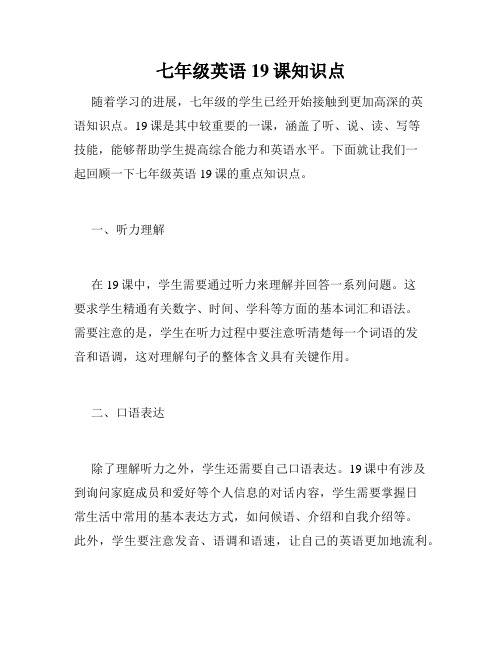
七年级英语19课知识点随着学习的进展,七年级的学生已经开始接触到更加高深的英语知识点。
19课是其中较重要的一课,涵盖了听、说、读、写等技能,能够帮助学生提高综合能力和英语水平。
下面就让我们一起回顾一下七年级英语19课的重点知识点。
一、听力理解在19课中,学生需要通过听力来理解并回答一系列问题。
这要求学生精通有关数字、时间、学科等方面的基本词汇和语法。
需要注意的是,学生在听力过程中要注意听清楚每一个词语的发音和语调,这对理解句子的整体含义具有关键作用。
二、口语表达除了理解听力之外,学生还需要自己口语表达。
19课中有涉及到询问家庭成员和爱好等个人信息的对话内容,学生需要掌握日常生活中常用的基本表达方式,如问候语、介绍和自我介绍等。
此外,学生要注意发音、语调和语速,让自己的英语更加地流利。
三、阅读理解19课中的阅读内容涉及到熟悉的话题,比如学校生活和家庭成员。
学生需要掌握常见的单词和句型,如形容词、名词、动词、副词等,并能够理解复杂的句子结构和篇章结构。
此外,课程中包括了已学过的语法知识点,如一般现在时态、疑问句和否定句等。
四、写作表达最后一个知识点涉及到写作表达。
学生需要通过写作来表达自己的观点和经历,并运用到前面所学的语法和词汇。
19课中的写作形式是书信,学生需要掌握常用的书信格式,如信头、称呼和结尾,并正确运用英文书写惯用语和代词等。
总之,七年级英语19课的知识点是比较全面的。
通过学习这些知识点,学生能够掌握基本的英语语言技能,不仅可以在课堂上更好地理解和回答问题,在日常生活用英语也会更加得心应手。
因此,我们要在学习英语的过程中,更加注重基础知识的掌握,积极提高英语综合能力。
2019版七年级英语上册满分冲刺第12讲阅读与表达讲义新版牛津版

2019版七年级英语上册满分冲刺第12讲阅读与表达讲义新版牛津版常见考点与解题步骤常见考点一般疑问句:肯定回答:Yes, 主语(代词)+be/助/情否定回答:No, 主语(代词)+ be/助/情not(n’t)切忌肯否定不一致选择疑问句:一般疑问句+or...?特殊疑问句,... or ...?回答用:or先后的选项之一来回答特殊疑问句:what 通常对“物”提问常用东西(人)的名称等回答w ho“谁”通常用以询问人的身份常用人名或人的身份来回答how“怎么样”,询问状态或方式常用形容词副词或by+名词/doing回答where“在哪里”,“哪儿”询问地点常用表示地点的副词或介词短语来回答when “什么时候”询问时间常用表示时间的副词或介词短语来回答Why“为什么”询问原因常用because+句子或to do结构回答How often“多久一次”问频率常用次数+时间范围回答How long“多久”通常问持续的时间长度常用(for)+ 时间段来回答How much“多少钱,多少(不可数名词)”常用钱数或数字加量词(单位)来回答How many“多少个(可数名词)”常用具体数字(+名词复数)来回答解题步骤➢浏览全文,掌握大意➢认真审题,判断问句类型,划出关键词➢锁定文章出处,提炼答案,满足问句的回答规范➢按要求回答问题,规范书写➢检查问答是否一致题一:1. Dogs like living with people. They are very friendly. They can do many things for people.2. Some do gs help people to look after sheep. Some dogs help people to find the lost children. Some dogs can help the blind, and they are the Seeing Eye Dogs.3. Now we can see this kind of dogs all over the world. They are working for the blind. The Seeing Eye Dog is strong and easy to train. He helps the blind to walk from place to place. Before a dog becomes a Seeing Eye Dog, he must learn in a training school for about three months. First the dog has to learn to sit or stay when he hears the trainer’s call. In his next lesson the dog learn s to take his trainer to cross busy streets. The dog has many things to learn. At the end of the trai ning he must take tests. When he passes the tests, the Seeing Eye Dog will do things by himself.4. The new master (主人) may be a man, a woman, or even a child. It takes the dog and his blind master about a month to learn to work and live together.Answer the questions accordi ng to the passage.1. Besides helping p eople to look after sheep and find the lost children, what else can dogs do?_________________________________________2. Where can we see the Se eing Eye Dogs now?_________________________________________3. How long must a dog learn in a training school before he becomes a Seeing Eye Dog?_________________________________________4. What must the dog do at the end of the training? _________________________________________5. Who may be the new master of a Seeing Eye Dog? _________________________________________第12讲阅读与表达题一:1. They can help the blind.2. All over the world.3. For about three months.4. He must take tests.5. A man, a woman or even a child.欢迎您的下载,资料仅供参考!。
七年级上英语第19课
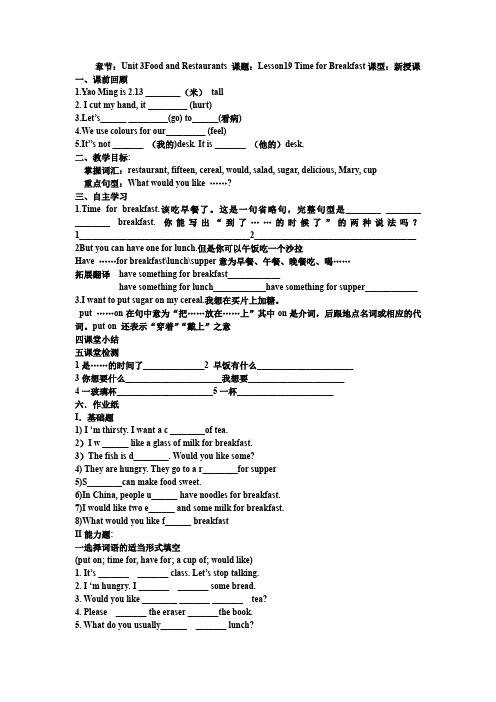
章节:Unit 3Food and Restaurants 课题:Lesson19 Time for Breakfast课型:新授课一、课前回顾1.Yao Ming is2.13 ________(米)tall2. I cut my hand, it _________ (hurt)3.Let’s______ _________(go) to______(看病)4.We use colours for our_________ (feel)5.It’’s not _______ (我的)desk. It is _______ (他的)desk.二、教学目标:掌握词汇:restaurant, fifteen, cereal, would, salad, sugar, delicious, Mary, cup重点句型:What would you like ……?三、自主学习1.Time for breakfast.该吃早餐了。
这是一句省略句,完整句型是________ ________ ________ breakfast. 你能写出“到了……的时候了”的两种说法吗?1_______________________________________2_____________________________________ 2But you can have one for lunch.但是你可以午饭吃一个沙拉Have ……for breakfast\lunch\supper意为早餐、午餐、晚餐吃、喝……拓展翻译have something for breakfast____________have something for lunch____________have something for supper____________ 3.I want to put sugar on my cereal.我想在买片上加糖。
(完整版)七年级英语上册19单元GrammerFocus翻译
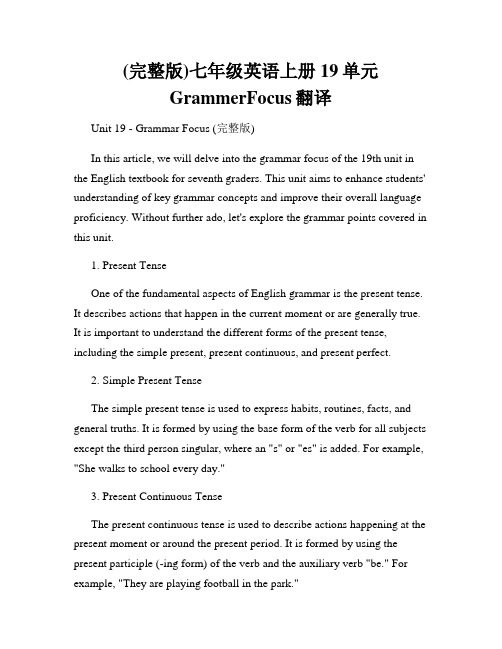
(完整版)七年级英语上册19单元GrammerFocus翻译Unit 19 - Grammar Focus (完整版)In this article, we will delve into the grammar focus of the 19th unit in the English textbook for seventh graders. This unit aims to enhance students' understanding of key grammar concepts and improve their overall language proficiency. Without further ado, let's explore the grammar points covered in this unit.1. Present TenseOne of the fundamental aspects of English grammar is the present tense. It describes actions that happen in the current moment or are generally true. It is important to understand the different forms of the present tense, including the simple present, present continuous, and present perfect.2. Simple Present TenseThe simple present tense is used to express habits, routines, facts, and general truths. It is formed by using the base form of the verb for all subjects except the third person singular, where an "s" or "es" is added. For example, "She walks to school every day."3. Present Continuous TenseThe present continuous tense is used to describe actions happening at the present moment or around the present period. It is formed by using the present participle (-ing form) of the verb and the auxiliary verb "be." For example, "They are playing football in the park."4. Present Perfect TenseThe present perfect tense is used to indicate an action that started in the past but has relevance to the present. It is formed by using the past participle of the verb and the auxiliary verb "have" or "has." For example, "I have visited Paris twice."5. Adverbs of FrequencyAdverbs of frequency are used to express how often something happens. They are commonly used with the simple present tense. Some examples of adverbs of frequency include "always," "often," "sometimes," "rarely," and "never." For example, "He always eats breakfast before going to school."6. Comparison of AdjectivesAdjectives can be compared to express degrees of quality or quantity. There are three forms of comparison: positive, comparative, and superlative. The positive form is used to describe a single item, while the comparative and superlative forms are used to compare two or more items. For example, "She is tall. He is taller than her. He is the tallest student in the class."7. Prepositions of Time and PlacePrepositions are words that show the relationship between a noun or pronoun and another word in the sentence. In this unit, students will learn about prepositions of time and place. Some common prepositions of time include "at," "on," and "in" to indicate specific time periods. Prepositions of place, such as "in," "on," and "at," are used to describe the location of an object or person.8. Modal VerbsModal verbs are auxiliary verbs that express ability, possibility, obligation, or necessity. Some commonly used modal verbs include "can," "could," "may," "might," "must," "shall," "should," "will," "would," and "ought to." They can modify the meaning of the main verb in a sentence. For example, "You should study for the test."By mastering the grammar points covered in this unit, students will be able to communicate more effectively and accurately in English. It is crucial to practice these concepts through various exercises and real-life examples to fully internalize them. Developing a solid foundation in grammar will greatly contribute to language acquisition and overall language proficiency.In conclusion, the 19th unit of the seventh-grade English textbook focuses on essential grammar concepts. By understanding and applying these grammar rules, students will improve their English language skills and become more proficient in expressing themselves accurately and fluently. Keep practicing and have fun while learning!。
牛津上海版七年级上册英语第19讲-语法综合复习
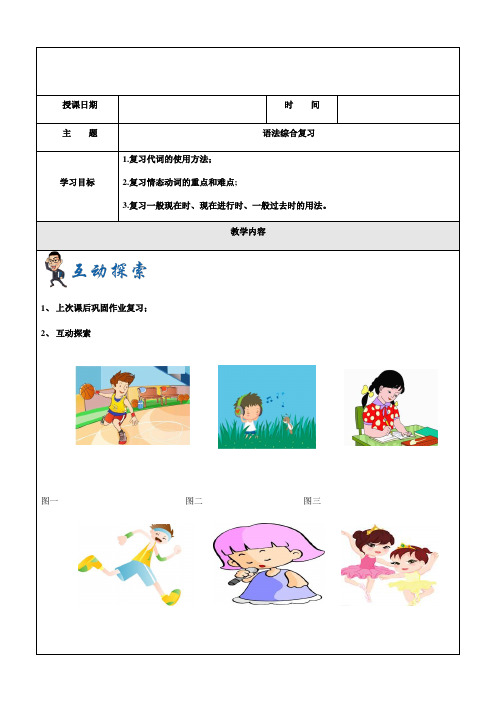
授课日期时 间主 题 语法综合复习 学习目标 1.复习代词的使用方法;2.复习情态动词的重点和难点;3.复习一般现在时、现在进行时、一般过去时的用法。
教学内容1、 上次课后巩固作业复习;2、 互动探索图一 图二 图三图四图五图六知识名称时态复习【知识梳理1】一般现在时(一)基本用法:1.表示客观真理,客观存在,自然现象。
Light travels faster than sound.The earth goes around the sun.2.表示经常的或习惯性的动作,常与表示频度的副词连用。
常用的频度副词有: often, always, usually, sometimes,every day/month/year, once a week/month/year. 频度副词在句中通常放在行为动词之前,系动词、助动词之后。
She is always ready to help others.I get up at six every day.3. 在由when, after, before, until, till, as soon as等引导的时间状语中或由if, unless, as long as等引导的条件状语从句中,如果主句是一般将来时、祈使句、有情态动词等,从句通常用一般现在时代替一般将来时。
即: 主将从现——主句一般将来时,从句一般现在时When she grows up, she’ll be a nurse and look after patients.I will tell him about it as soon as he comes.If it is fine tomorrow, we will go outing.I won’t forgive him unless she says sorry to me.D on’t give up until you succeed.4. 一般现在时的动词形式通常与动词原形相同,但在主语为第三人称单数时,词尾加-s或-es,其规则如下:1) 一般动词都在词尾加-s,如:digs, sings, looks, lives, cleans 等。
2023冲刺中考书面表达句子积累七年级上册
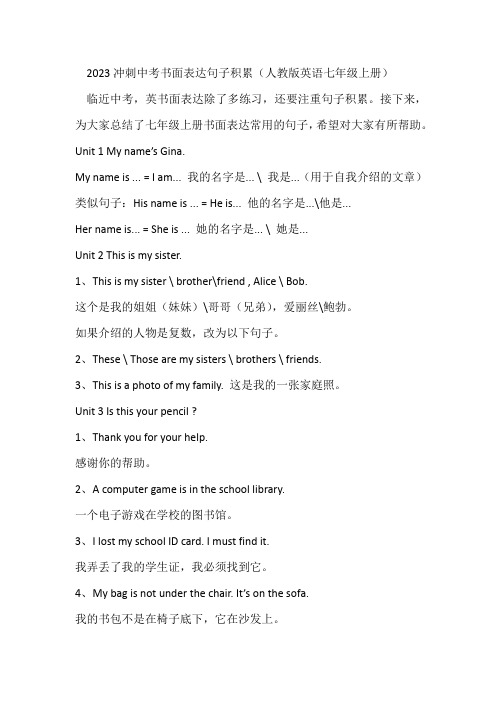
2023冲刺中考书面表达句子积累(人教版英语七年级上册)临近中考,英书面表达除了多练习,还要注重句子积累。
接下来,为大家总结了七年级上册书面表达常用的句子,希望对大家有所帮助。
Unit 1 My name’s Gina.My name is ... = I am... 我的名字是... \ 我是...(用于自我介绍的文章)类似句子:His name is ... = He is... 他的名字是...\他是...Her name is... = She is ... 她的名字是... \ 她是...Unit 2 This is my sister.1、This is my sister \ brother\friend , Alice \ Bob.这个是我的姐姐(妹妹)\哥哥(兄弟),爱丽丝\鲍勃。
如果介绍的人物是复数,改为以下句子。
2、These \ Those are my sisters \ brothers \ friends.3、This is a photo of my family. 这是我的一张家庭照。
Unit 3 Is this your pencil ?1、Thank you for your help.感谢你的帮助。
2、A computer game is in the school library.一个电子游戏在学校的图书馆。
3、I lost my school ID card. I must find it.我弄丢了我的学生证,我必须找到它。
4、My bag is not under the chair. It’s on the sofa.我的书包不是在椅子底下,它在沙发上。
5、I’m tidy , but Gina is not.我很整洁,但是蒂娜就不。
6、I have a clock. It’s on the desk.我有一个时钟,它在书桌上。
7、My pencil box is in my schoolbag and my schoolbag is under the desk.我的铅笔盒在书包里面,我的书包在书桌下面。
七年级英语Unit 19人教版(朗文)知识精讲
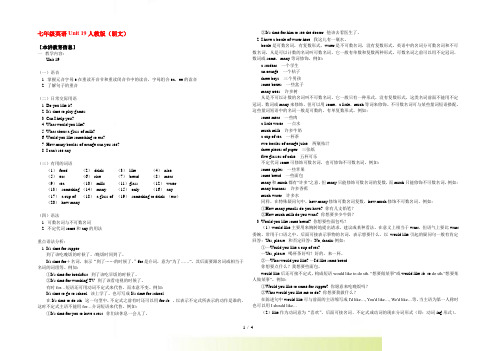
七年级英语Unit 19人教版(朗文)【本讲教育信息】一. 教学内容:Unit 19(一)语音1. 掌握元音字母e在重读开音节和重读闭音节中的读音,字母组合ea,ee的读音2. 了解句子的重音(二)日常交际用语1. Do you like it?2. It's time to play games .3. Can I help you?4. What would you like?5. What about a glass of milk?6. Would you like something to eat?7. How many bottles of orange can you see?8. I can't see any .(三)有用的词语(1)food (2)drink (3)like (4)nice(5)eat (6)rice (7)bread (8)meat(9)tea (10)milk (11)glass (12)water(13)something (14)many (15)only (16)any(17)a cup of (18)a glass of (19)something to drink (eat)(20)how many(四)语法1. 可数名词与不可数名词2. 不定代词some和any的用法重点语法分析:1. It's time for supper.到了该吃晚饭的时候了。
/晚饭时间到了。
It's time for+名词,表示“到了……的时候了。
”for是介词,意为“为了……”,其后面要跟名词或相当于名词的词组等。
例如:①It's time for breakfast. 到了该吃早饭的时候了。
②It's time for watching TV. 到了该看电视的时候了。
有时for…短语还可用动词不定式来代替,而本意不变。
七年级英语上册复习资料及冲刺技巧
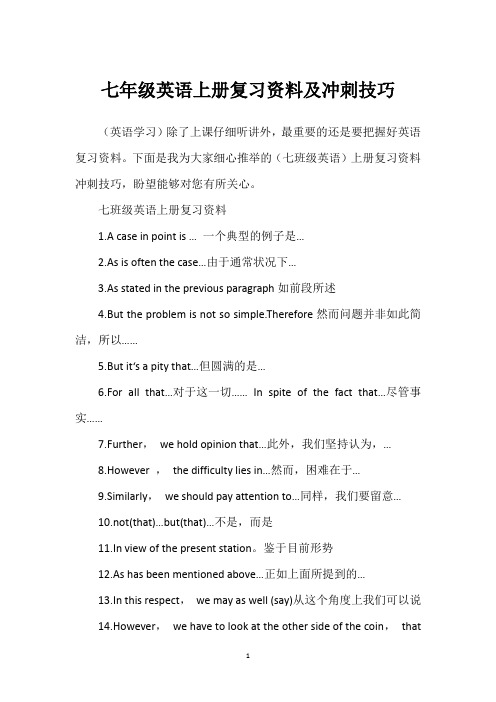
七年级英语上册复习资料及冲刺技巧(英语学习)除了上课仔细听讲外,最重要的还是要把握好英语复习资料。
下面是我为大家细心推举的(七班级英语)上册复习资料冲刺技巧,盼望能够对您有所关心。
七班级英语上册复习资料1.A case in point is … 一个典型的例子是…2.As is often the case…由于通常状况下…3.As stated in the previous paragraph如前段所述4.But the problem is not so simple.Therefore然而问题并非如此简洁,所以……5.But it‘s a pity that…但圆满的是…6.For all that…对于这一切…… In spite of the fact that…尽管事实……7.Further,we hold opinion that…此外,我们坚持认为,…8.However ,the difficulty lies in…然而,困难在于…9.Similarly,we should pay attention to…同样,我们要留意…10.not(that)…but(that)…不是,而是11.In view of the present station。
鉴于目前形势12.As has been mentioned above…正如上面所提到的…13.In this respect,we may as well (say)从这个角度上我们可以说14.However,we have to look at the other side of the coin,thatis…然而我们还得看到事物的另一方面,即…七班级上册英语高频考点1. as…as 和……一样中间必需用形容词或副词原级。
例如:This classroom is as big as that one.这间教室和那间一样大。
冀教版七年级英语上册Lesson19 课件 (共18张PPT)精编版

Homework Write a text about your breakfast.
A: Can I have some/a/an …? (I want to put.. on..) Mum: Sure. How about you? Would you like some…?
B: No, thanks. I’m not very hungry. I just want…
Pair work
It’s seven fifteen. Time for breakfast! Lynn: What’s for breakfast, Dad? Mr. Smith: We have _c_e_r_e_al_, _b_r_e_a_d_, _f_r_u_it__ and _j_u_i_ce__. What would you like? Lynn: Hmm. Can I have a _s_a_la_d__? Mr. Smith: No, I didn’t _m__ak_e__ a salad. But you can have one for _l_u_n_c_h__.
New words
would salad
aux. 将,愿意 n. 色拉
sugar
n.
糖
delicious adj. 美味的;可口的
cup fifteen
n. 杯子 num. 十五
cereal
n. 谷类食品
restaurant n. 饭店
Listen and fill in the blanks.
连词成句 1.would , you, what, like __W__h_a_t_w_o_u_l_d_y_o_u_l_ik_e_?___ 2.for,breakfast,what,is __W__h_a_t_is__fo_r_b_r_e_ak_f_a_st_?___ 3.want,a,cup,of,I,just,tea ___I_ju_s_t_w_a_n_t_a_c_u_p_o_f__te_a_.__ 4.cakes,are,delicious,these __T_h_e_s_e_c_a_k_e_s _a_re_d_e_l_ic_i_ou_s_.__ 5. I, want, sugar, to, on, my, put, cereal __I_w__a_nt_t_o_p_u_t_s_u_g_a_r _o_n_m_y__c_er_e_a_l.______
七年级英语上Lesson19

lunch/having lunch It is time for________________.
have lunch It is time to ________________.
2.I would like some bread and a glass of juice for breakfast.
milk
sugar
I put milk and sugar on the cereal.
I put sugar and milk on it.
我在(麦片)粥里加上牛奶和糖。 put... on... 在句中意为把...放在...上,其中 on是介词,后跟地点名词或相应的代词。 eg: I put my book on the desk. Please put your leg on the stage.
I’d like= I would like,其中 would like 表(说话人)意愿。
eg: a.我现在想吃鱼。
b.我现在不想吃鱼。
would like a.I __________fish now. wouldn’t like b.I __________ fish now.
3.I can write it down.我能记下。
1.Write a text about your breakfast. 2.Read the dialogue twic 3. Preview lesson 20
I just want a cup of tea.
5.cakes,are,delicious,these
These cakes are delicious.
6.and,milk,sugar,on,it,put
2019版七年级英语上册 满分冲刺 第14讲 阅读理解之细节题讲义 (新版)牛津版

2019版七年级英语上册满分冲刺第14讲阅读理解之细节题讲义(新版)牛津版细节题的解答技巧信息查找1.从问题中找到关键词;2.以此关键词为线索,运用略读和查读等技巧在文中迅速寻找和这一细节有关的信息;3.找到信息源后再把这一部分内容仔细阅读一遍,仔细推敲答案;4.在准确理解细节的前提下,最后确定答案信息转化1.锁定了问题中的关键词但原文无该词,那就查找同义词,或同意表述2. 锁定原文答案出处,但选项中无相同答案,需要认真阅读原句,弄清句意,再甄别选项,选出同义表达;或运用淘汰法,删除非同义选项及无关项。
题一:小试牛刀There are some very good things about open education. This way of teaching allows the students to grow as people, and to develop their own interests in many subjects. Open education allows students to be responsible for their own education, as they are responsible for what they do in life. Some students do badly in a traditional classroom. The open classroom may allow them to enjoy learning. Some students will be happier in an open education school. They will not worry about grades or rules. For students who worry about these things a lot, it is a good idea to be in an open classroom.But many students will not do well in an open classroom. For some students, there are too few rules. These students will do little in school. They will not make good use of open education. Because open education is so different from traditional education, these students may have a problem getting used to making so many choices. For many students it is important to have some rules in the classroom. They worry about the rules even when there are no rules. Even a few rules will help this kind of students.The last point about open education is that some traditional teachers do not like it.Many teachers do not believe in open education. Teachers who want to have an open classroom may have many problems at their schools.1. Open education allows the students to ______.A. be late for schoolB. be responsible for their familiesC. develop their own interestsD. discover subjects outside class2. Open education may be a good idea for the students who ______.A. enjoy traditional learningB. worry about grades or rulesC. do well in a traditional classroomD. are responsible for what they do3. Some students will do little in an open classroom because ______.A. there are too few rulesB. they hate activitiesC. open education is meaninglessD. they worry about the rules题二:全面升级Edie Jarolim is a travel writer and food critic (评论家) . “I always loved traveling and always liked to eat, but I never thought about that I could make money doing both of those things.” Jarolim said. Now you can read her travel advice everywhere.Her job in travel writing began eight years ago. After learning English in Canada, she took a test for Frommer’s travel guides, passed it, and got the job. After working at Frommer’s, Jarolim worked for a while at Rough Guides in London, then Fodor’s, where she fell so in love with a film about the Southwest of the U.S. that she moved there. Now as a travel writer, she spends one-third of her year on the road. The rest of the time is spent writing.She said that the hard part of her job is fact-checking all the information. Sure,it’s great to write about a beautiful place, but you’d b etter get to the local (当地的) museum and spend hours correcting or you could really ruin (毁掉) someone’s vacation.1. Which country does Jarolim live in now?A. MexicoB. The U.S.C. The U.K.D. Canada2. What is difficult for Jarolim?A. Working in different places to get informationB. Finishing her work as soon as possible.C. Checking all the facts in her writing.D. Passing a test to be a travel writer.第14讲阅读理解之细节题题一:1.C 2.B 3.A题二:1.B 2.C。
人教七(上) 19单元复习知识点教案

教学过程一、课堂导入通过对于一些基本的单词、短语和句型以抽查的形式检查。
温故知新,复习总结,把所学的知识上升到理论高度。
强化成就感,及时总结得失,顺利完成从小学到初中的转变,争取完全上轨道。
询问学生或让学生之间互相询问,复习本节课所需句型。
二、复习预习1. What’s your ________ subject?A. likeB. mostC. favoriteD. good【答案】C【解析】根据句意:你最喜爱的科目是什么,所以选C。
2. ---What’s your favorite ________? ---Blue.A. penB. bookC. sportD. color【答案】D【解析】根据回答是颜色,所以D。
3. ---________ does he like blue? ---Because the color makes him happy.A. WhatB. WhenC. WhyD. How 【答案】C【解析】根据回答用because,所以提问用why,选C。
4. P.E. is my favorite subject ________ it’s interesting.A. forB. andC. butD. because 【答案】D【解析】描述原回用because,所以选D。
5. Steve’s favorite ________ is Monday,because he has P.E. that day.A. timeB. monthC. yearD. day【答案】D【解析】Monday周一是具体某一天,所以是最喜爱的一天,选D。
6. Why ________ your mother like cooking (烹调)?A. doB. isC. areD. does 【答案】D【解析】本句是主+谓+宾结构,主语your mother是单三,一般疑问句用does,选D。
201X版七年级英语上册满分冲刺第19讲书面表达之遣词造句讲义新版牛津版

2019版七年级英语上册满分冲刺第19讲书面表达之遣词造句讲义新版牛津版题一:假设你是李华,你的笔友John写信想了解一下你目前所在的年级和在校的学习生活,请你写信告诉他你的学习状况和最喜欢的科目及原因并询问他的最爱科目。
要求:1. 词数80左右;2. 叙事清楚,语句通顺,语意连贯;3. 文中不得出现真实的人名与校名。
开头简单寒暄引出话题引领全文首段内容很高兴/感谢收到你的上一封信。
你询问我的学习生活和最喜欢的科目。
在这封信中我来给你讲述这些。
遣词I’m glad to…receiveThanks for…last letterwant toknow aboutschool lifefavouritesubjecttell造句从最小单位开始扩充:I am glad to receive your last letter.You w ant to know about my school life and favorite subject.Now let me tell you something in this letter.要点:1. 我的学习生活2. 最喜欢的科目及原因3. 询问对方相关情况要点一我的学习生活:我是一名七年级的学生周一到周五上学学习的科目很多,例如:语文,英语,数学,科学等等。
遣词Grade 7go to schoolfrom Monday to Fridaymany subjectssuch asChinese,maths,English,science…造句I am a student in Grade Seven.I go to school from Monday to Friday.We have many subjects to learn, such as Chinese, maths, English and science. 要点二我最喜欢的科目是________.因为它很有用,很有趣。
2019版七年级英语上册满分冲刺第11讲补全对话讲义新版牛津版

2019版七年级英语上册满分冲刺第11讲补全对话讲义新版牛津版解答步骤➢通读全文,弄清情景➢再读文章,放慢节奏➢联系上下,锁定答案➢先易后难,排除干扰➢通读全文,判断正误小试牛刀题一:从方框中选出合适的句子,填在对话空缺处,使对话内容完整、连贯。
有两项是多余的。
A: Hi, David. 1B: No, I’m not.A: 2B: It’s Tuesday.A: So?B: 3A: You don’t like ma th?B: 4 My father says it’s interesting, but I don’t think so.A: 5B: Chinese. It’s difficult but interesting!A: 6B: Mr. Hu. His lesson always makes us relaxed(放松).A: When is your Chinese class?B: 7 I have to go now! I have math, history and scienc e this morning.A: OK, see you.B: 8A. What’s wrong?B. Are you OK?C. So what’s your favorite subject?D. I have two math classes on Tuesday.E. It’s on Monday, Wednesday,Thursday and Friday.F. No. It's so difficult!G. Bye!H. I’m fine, thanks.I. Who is your Chinese teacher?J. Thank you.挑战升级题二:从方框中选出合适的句子,填在对话空缺处,使对话内容完整、连贯。
有两项是多余的。
A: Th e traffic is very busy in t he morning, isn’t it?B: Yes, it is. And the bus is always late. 61A: The No. 6 bus to the train station.B: Do you work here in Gucheng?A: No, I don’t. I’m just a tourist.B: 62A: Yes, I have been here three times.B: 63A: Daxieshan, Cheng’ensi, Xiaosanxia and so on.B: What do you think of Gucheng?A: It’s beautiful. 64B: Do you like the foo d of Gucheng?A: Yes, I do. Gucheng beef noodles are very d elicious.B: So do I. 65 Have a good trip!A:Thank you very much. Bye-bye!B: Bye!A. Have you ever been here before?B. Great changes have taken place these years.C. How long have you been in Gucheng?D. Oh, here comes the No.6 bus.E. It’s time for getting on the train now.F. What places have you been to?G. Which bus are you waiting for?第11讲补全对话题一:1. B 2. A 3.D 4. F 5. C6. I7. E8. G题二:61. G 62. A 63. F64. B 65. D欢迎您的下载,资料仅供参考!。
七年级英语Unit 19人教版(朗文)知识精讲

七年级英语Unit 19人教版(朗文)【本讲教育信息】一教学内容:Unit 19(一)语音1 掌握元音字母e在重读开音节和重读闭音节中的读音,字母组合ea,ee的读音2 了解句子的重音(二)日常交际用语1 Do ou ie it2 It' time to e for ue to do 你想要我做什么在陈述句中woud ie可与前面的主语缩写成I'd ie…, You'd ie…, We'd ie…等。
当主语为第一人称时也可以用I houd ie…(2)ie作为动词意为“喜欢”,后面可接名词、不定式或动词的现在分词形式(即:动词-ing形式)。
例如:①We ie Engih ver much 我们非常喜欢英语。
②I ie to e和anome和an都表示“一些”,两者都可以修饰可数名词的复数形式,也可修饰不可数名词,区别在于ome一般用于肯定句中,an用于一般疑问句和否定句中。
在疑问句和否定句中,an作“任何的,一些”解。
例如:①I'd ie ome tea 我想要些茶。
②Do ou want an cae 你想要一些蛋糕吗③I don't have an friend in Beijing 在北京我没有任何朋友。
在表示请求、建议或征求意见等疑问句中,一般用ome修饰名词,而不用an。
例如:①Woud ou ie ome banana 你想要些香蕉吗②Woud ou ie ome coe 喝点可乐好吗5 What about omething to eat 吃点什么东西怎么样句中的动词不定式“to eat”在这儿作定语,修饰前面的不定代词omething。
例如:①What about omething to drin 来点喝的东西怎么样②Woud ou ie omething to read 你想看些书报吗6 We'd ie a botte of a fami The are m father, mother, iter and I我家有四口人,他们是我的爸爸、妈妈、姐姐和我。
- 1、下载文档前请自行甄别文档内容的完整性,平台不提供额外的编辑、内容补充、找答案等附加服务。
- 2、"仅部分预览"的文档,不可在线预览部分如存在完整性等问题,可反馈申请退款(可完整预览的文档不适用该条件!)。
- 3、如文档侵犯您的权益,请联系客服反馈,我们会尽快为您处理(人工客服工作时间:9:00-18:30)。
2019版七年级英语上册满分冲刺第19讲书面表达之遣
词造句讲义(新版)牛津版
题一:假设你是李华,你的笔友John写信想了解一下你目前所在的年级和在校的学习生活,请你写信告诉他你的学习状况和最喜欢的科目及原因并询问他的最爱科目。
要求:
1. 词数80左右;
2. 叙事清楚,语句通顺,语意连贯;
3. 文中不得出现真实的人名与校名。
开头
简单寒暄
引出话题
引领全文
首段内容
很高兴/感谢收到你的上一封信。
你询问我的学习生活和最喜欢的科目。
在这封信中我来给你讲述这些。
遣词
I’m glad to…
receive
Thanks for…
last letter
want to
know about
school life
favourite
subject
tell
造句
从最小单位开始扩充:
I am glad to receive your last letter.
You w ant to know about my school life and favorite subject.
Now let me tell you something in this letter.
要点:
1. 我的学习生活
2. 最喜欢的科目及原因
3. 询问对方相关情况
要点一
我的学习生活:
我是一名七年级的学生
周一到周五上学
学习的科目很多,例如:语文,英语,数学,科学等等。
遣词
Grade 7
go to school
from Monday to Friday
many subjects
such as
Chinese,maths, English,science…
造句
I am a student in Grade Seven.
I go to school from Monday to Friday.
We have many subjects to learn, such as Chinese, maths, English and science. 要点二
我最喜欢的科目是________.
因为它很有用,很有趣。
我们的__________老师是个非常友善的人,我们都喜欢他/她的课。
遣词
because
useful
important
interesting
kind/nice
造句
My favourite subject is English, because it is useful and interesting. Our English teacher i s very kind, and we all like her class.
要点三+结尾
你能写信告诉我你最喜欢的科目是什么吗?
请快点给我回信吧。
祝你好运。
遣词
Can you …?
tell…about…
Please write to…
good luck
best wishes
造句
Can you tell me about your favourite subject?
Please write to me soon.
Good luck and best wishes.
遣词
用词要准确
词性要考虑
丰富性
多积累
重拼写
造句
从最小单位开始
保证句子的完整性,准确性
可用介词短语扩句可用连词连接
第19讲书面表达之遣词造句
题一:
Dear John,
I’m glad to receive your last letter. You want to know about my sch ool life and favourite subject. Now let me tell you something in this letter.
I am a student in Grade 7. I go to school from Monday to Friday. We have many subjects to learn, such as Chinese, maths, Eng lish and science. My favorite one is English because English is very important and interesting. Our English te acher is very kind , and we all love her class.
Can you tell me about your favorite subject? Please write to me soon. Good luck and best wishes.
Yours,
Li Hua
欢迎您的下载,资料仅供参考!。
